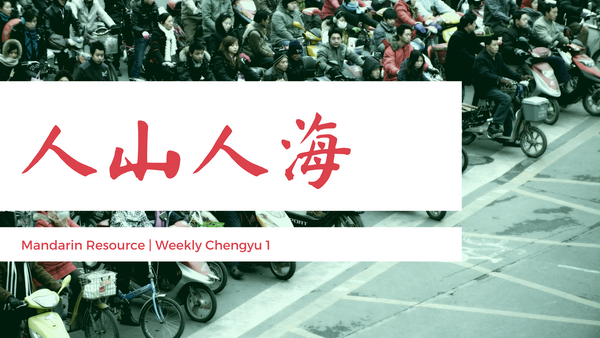盲人摸象 / máng rén mō xiàng - Chengyu

Can't see the wood for the trees
Derived from the Nirvana Sutra, 盲人摸象 / máng rén mō xiàng is a nod to Buddhist thought and philosophy. Most closely translated to the English idiom "Can't see the wood for the trees", this chengyu means to not appreciate the bigger picture or not understand the wider situation.

| Character | Pinyin | Meaning |
|---|---|---|
| 盲 | máng | Blind (person); To not see |
| 人 | rén | Person; People |
| 摸 | mō | Tough; To caress |
| 象 | xiàng | Elephant |
Blind person touch elephant
Despite, like many chengyu, having a fun Chinglish translation, this chengyu's origin in Buddhist scripture makes it a commonly used and widely understood chengyu in Chinese life. It's completely native and natural, making it perfectly suitable both for everyday conversation and relaxed business environments.
The characters 人rén and 象xiàng (meaning people and elephant) are quite common characters that all but the earliest of beginner Mandarin students will be familiar with. 盲máng and 摸mō, however, are far less common. Whilst they're both HSK words, the earliest they appear is HSK5 and HSK6 respectively, so don't be surprised if you haven't seen them before. As far as learning is concerned, if you're not yet studying at those advanced HSK levels, simply remembering the pīnyīn of the expression is enough to use this chengyu. Intimately and confidently understanding the exact usage and meaning of these two characters is not a requisite to using this expression.
I find that this chengyu's deeper connection to Buddhism and the important message to learn from it - not to have our heads in the weeds; to always consider the bigger picture - make it a superb chengyu to keep in your Mandarin toolbox.
Example
我刚开始学习汉语学的时候,就像盲人摸象。我学得越多,我懂的也越多了。 When I first started learning Chinese, I didn't see the bigger picture. The more I studied, the more I understood.
I hope you find an opportunity to impress your teacher or native friends and use this chengyu soon. If you have any interesting stories involving this Chengyu, please let me know! You can comment below or send me an email. If you enjoyed this short article and would like to learn more chengyu, please consider joining my mailing list (it's free, no spam).
If you're on your own Mandarin learning journey - whether you just started today or you're a polyglot who has lived in China for 15 years - you'll find insightful and opinionated reviews, introductions to Chinese culture, and my first-hand perspectives every step of the way.
You can join the mailing list (it's free!) and get updates straight to your inbox on this site, follow me on Instagram @mandarinresource or email me josh@mandarinresource.com.




